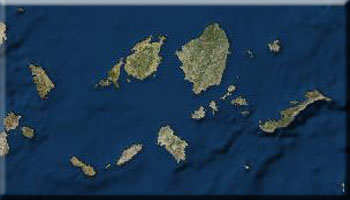The island's history parallels the history of the other Cyclades.
Ios is known as the home of Clemene, mother of the greatest epic poet of all time, Homer, who wrote The Odyssey and The Iliad in the eighth century B.C. Homer's grave is at Plakotos and in local lore he died on the island while trying to solve a riddle he was told by fishermen at Plakotos.
The earliest signs of inhabitation on the island suggest it the influence of settlers from the shores of Asia Minor. The island later witnessed the destruction of Minoan civilization (2000-1500 B.C.) on Santorini from a volcanic eruption. The Dorians and Ionians arrived on the island sometime around 1100 B.C. and gave it its present-day name. Ios joined the Athenian League (or Confederacy). In the early 13th century, it came under Venetian rule; in 1397, Marcus Crispus, the island's governor, fortified Hora with defensive walls (Kastro), whose ruins are visible today.
In 1537, the island fell to the Turks, who dubbed it "Little Malta" because the natural shelter offered by its harbor. The island suffered under its Turkish rules, who imposed heavy taxes and other punishments. During this time, the island also suffered from pirate raids.
The island claims among its native sons Spyridon Valetas (1718-1843), a member of the revolutionary Filike Etaireia who distinguished himself in the Greek war of independence. Valetas later became the first Minister of Education of the Modern Greek State.


































